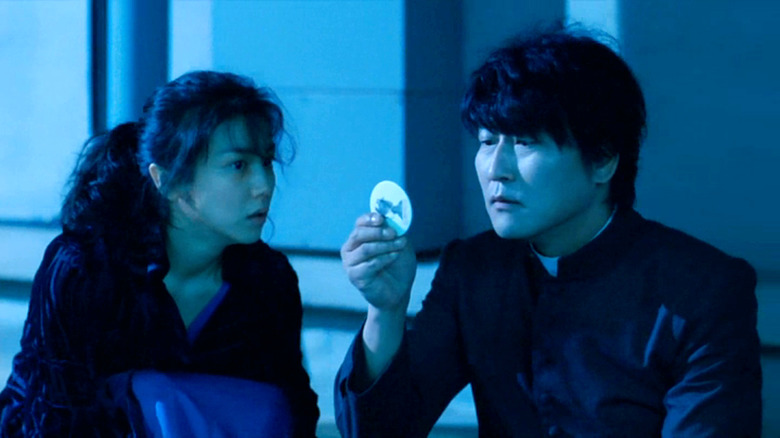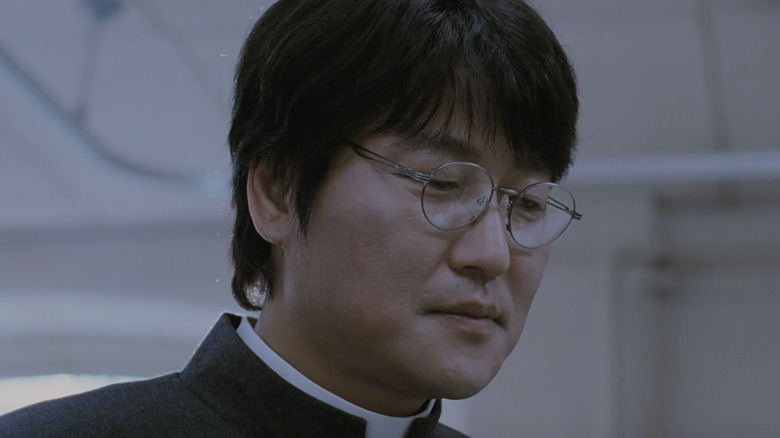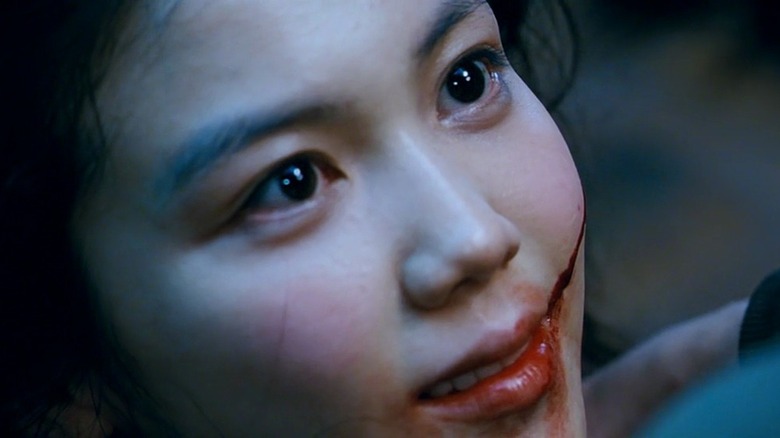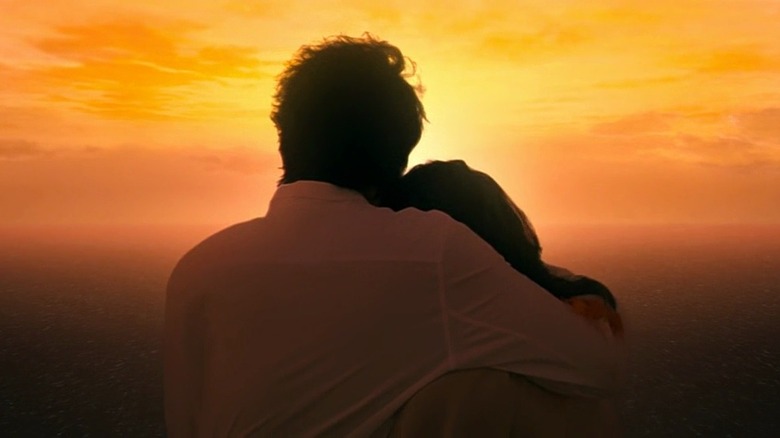Year Of The Vampire: In Thirst, Park Chan-Wook Took The Lust For Life To Its Bloodiest Limits
(Welcome to Year of the Vampire, a series examining the greatest, strangest, and sometimes overlooked vampire movies of all time in honor of "Nosferatu," which turns 100 this year.)
In Park Chan-wook's "Thirst," the conventional vampire thirst for blood takes on broader meaning as it's aligned with the hidden desires of a Catholic priest and a woman trapped in an unfulfilling domestic life. Park just won Best Director at the Cannes Film Festival for his new movie, "Decision to Leave," and before May wraps up, there's no better vampire pick for Asian American and Pacific Islander Heritage Month than "Thirst."
Themes of vengeance and desire run all throughout Park's filmography, from "Oldboy" to "The Handmaiden" and everything in-between, but in "Thirst," they found expression in an erotic thriller that just so happened to feature bloodsucking. "Thirst" came along in 2009 to capitalize on the renewed vampire craze that "Twilight" and "True Blood" had started the year before. While Robert Pattinson was sparkling in sunlight at the multiplex, Cannes Best Actor winner Song Kang-ho ("Memories of Murder," "Parasite") was fighting back blisters and boils at your local arthouse theater in "Thirst."
"Thirst" is one of the few great K-horror films that Hollywood hasn't remade, with even the zombie hit "Train to Busan" now receiving the remake treatment as "Last Train to New York." Yet "Thirst" is actually a loose adaptation: Park grafted vampire tropes onto Émile Zola's 1868 novel "Thérèse Raquin." Echoes of the book can be seen in the story of Tae-ju (Kim Ok-bin), whose oppressive living situation sees her caring for a sickly husband and dealing with a domineering mother-in-law. Her dangerous liaisons with Song's character provide bouts of escape, but this is no romance novel. It's a movie where mahjong meets mayhem.
What it brought to the genre
Vampire movies have always been the stuff of world cinema, with this whole Year of the Vampire stemming from the 100-year anniversary of a German silent film. "Thirst" brought live-action Asian talent to the genre and proved that it was ripe for exploration beyond anime and Western culture. Though of course, Park himself recognized that the very concept of vampirism, not to mention Catholicism, was "part of the Western tradition" entering Korea. In a New York Times interview, he said "Thirst" was about "things that are coming from the outside entering in," to be accepted or rejected.
Song plays Sang-hyun, a priest who rejects life in some ways and may even have a death wish. As he is hearing a woman's confession, Sang-hyun foreshadows his own eventual vampire fate, saying, "Suicide is to die a martyr for Satan." He then prescribes "20 Hail Marys" and "lots of sun," telling the woman, "Get God's help through science and take some antidepressants. Stop thinking about killing yourself."
Based on her reaction, it almost seems like he's talking more to himself than her. "You just stick to praying," she says. That's not enough for Sang-hyun, however. He soon visits a biochemical lab, where he volunteers to be a test subject for the "Emmanuel Virus," which seems to liken the Hebrew name meaning "God is with us" to a mind virus à la Richard Dawkins — perhaps as a reflection of Park's own Catholic upbringing and move to atheism as an adult.
The doctor warns Sang-hyun that he fits the profile of other single Asian or Caucasian male missionaries who have volunteered as a form of "dramatic suicide," but he becomes the first to survive the ravages of side effects like vomiting blood and losing his fingernails.
Thirst for pleasure
When Sang-hyun comes back to life as the Bandaged Saint, other members of the faithful mob him, carrying his mummified effigy on crosses. Mrs. Ra (Kim Hae-sook) asks him to visit her ill son, Tae-ju's husband, Kang-woo (Shin Ha-kyun), and as it turns out, they know each other from childhood, so Sang-hyun fits right in with the family.
During the family's mahjong games, the morose Tae-ju is left to sit at the kiddie table until the flatulent Kang-woo's hot water bottle needs refilling. He manhandles her and drops her on the floor, humiliating her in front of their guests, and she stops short of slapping him before wiping the snot from his nose. We also see her flirt with stabbing him at night, as she drives a pair of shears down into the open air of his snoring mouth.
Tae-ju's mother-in-law, Mrs. Ra (Kim Hae-sook), likens her to a puppy, and later, Tae-ju herself says, "I lived as their dog my whole life." The only time she feels awake and alive is when she's running barefoot on the street outside under the pretense of "sleepwalking."
Tae-ju also awakens desire in Sang-hyun, which he tries to put down by caning himself with his flute at first. It's no coincidence that his symptoms return and his blood-drinking vampire side emerges after he starts to fall for his friend's wife. Blood is finger-licking good for him when no one's looking; he sips it from a comatose patient's IV like a drinking straw, but Catholic guilt immediately leads him to throw himself out the window afterwards.
Sang-hyun can only deny his vampire nature for so long, though, and in due course, he surrenders to desire, proclaiming amid a secret rendezvous with Tae-ju, "Now, I thirst after sinful pleasures."
Cup runneth over
In "Thirst," the two central characters are governed by repressive forces. For Tae-ju, it's her family, which literally locks her in at night. For Sang-hyun, it's his religion, which necessitates resisting temptation.
Tae-ju says she's not a shy person — implying that she's inhibited more by circumstance — and as the movie grows more twisty and twisted, we see just how true that is. Sang-hyun wants to run away with her, but she manipulates him to her own murderous ends. Despite this being a vampire movie, she's ready to pull a "Place in the Sun" boat maneuver on her husband.
Becoming a vampire by way of a warped "birthday" party reveals how truly monstrous Tae-ju (and human nature in general) can be when left unchecked. In contrast to Sang-hyun, Tae-ju doesn't believe in hell, so she has no compunctions about killing. If anything, she enjoys it, since for her, blood taken rather than given tastes better, whereas Sang-hyun goes for the easy blood in hospitals.
At the beginning, "Thirst" registers as sarcastic in its portrayal of priestliness, with Sang-hyun reassuring a sick patient that his good deeds will be remembered "absoposilutely." Yet by the end, he's ready to do some good deeds of his own: saving the innocent Filipina, freeing people of their belief in a false saint, and ridding the world of two beings who can only live by feeding on human blood.
"Thirst" takes it vampires on a journey of liberation, allowing them to leap from rooftops and away from social constraints until bloodshed erupts and there's nowhere left to go but into the sunlight. For all its abandon, Park's film recognizes that there is such a thing as drinking too much of life, and it finds a certain bittersweet resolve in being stuck with each other.



